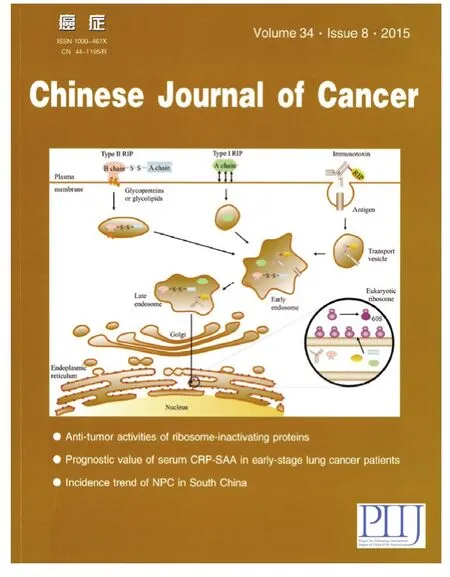肿瘤学
2015-11-01
肿瘤学

来源出版物:Chinese Journal of Cancer,2015,34(8): 325-334联系邮箱:JIANG Wen-qi; jiangwq@sysucc.org.cn
封面介绍:Ribosome-inactivating proteins(RIPs)are a family of enzymes that inhibit the eukaryotic ribosome via N-glycosidase activity,by which they cleave a specific adenine residue from the 28S RNA within the 60S ribosomal subunit,therefore inhibiting protein synthesis. Different types of RIPs enter the cell through endocytosis and are subsequently degraded in the endoplasmic reticulum. They inactivate ribosomes through cleavage of the A4324 N-glycosidic bond,resulting in protein synthesis blockade. The cover art shows the entry pathways of type I RIPs,type II RIPs,and immunotoxins. For more details,please read the article on pages 325-334.(The cover art is provided by ZENG Mei-qi and colleagues.)
Anti-tumor activities and apoptotic mechanism of ribosome-inactivating proteins
ZENG Mei-qi; ZHENG Man-yin; LU De-sheng; et al.
Ribosome-inactivating proteins(RIPs)belong to a family of enzymes that attack eukaryotic ribosomes and potently inhibit cellular protein synthesis. RIPs possess several biomedical properties,including anti-viral and anti-tumor activities. Multiple RIPs are known to inhibit tumor cell proliferation through inducing apoptosis in a variety of cancers,such as breast cancer,leukemia/lymphoma,and hepatoma. This review focuses on the anti-tumor activities of RIPs and their apoptotic effects through three closely related pathways:mitochondrial,death receptor,and endoplasmic reticulum pathways.
ribosome-inactivating protein(RIP); anti-tumor; apoptosis; cancer
